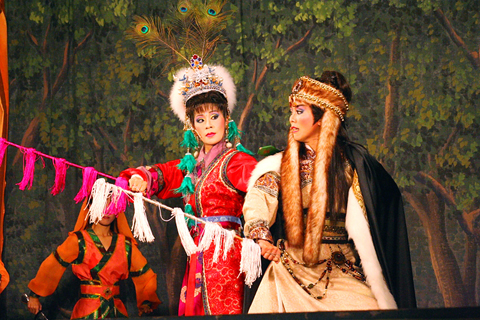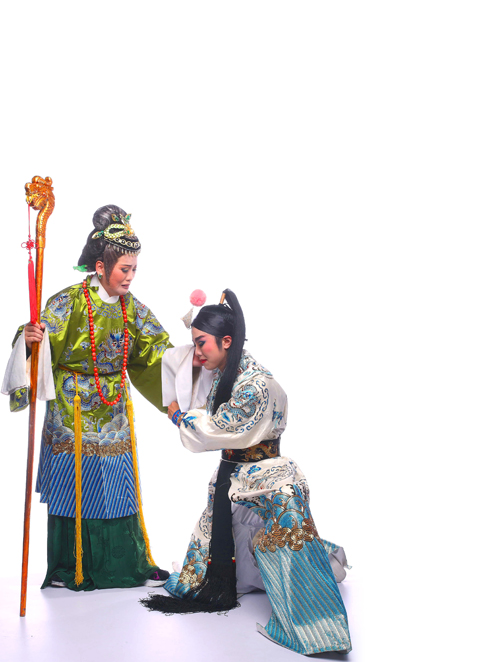Gezai opera (歌仔戲) has good claim to being the kind of opera most representative of Taiwan, and it is for this reason that the Taipei Cultural Center (台北市立社會教育館, TCC) has been working with the Taipei City Government over the last decade to hold the biennial Taiwanese Opera Collective Performances (臺北市歌子戲觀摩匯演), which will comprise a total of 13 performances starting tonight until July 20 at the Mengjia Park (艋舺公園) next to the Longshan Temple (龍山寺) in Taipei’s Wanhua District (萬華區).
This particular event started in 1999 but is actually a continuation of a long tradition going back to the 1940s when regional cultural bodies sought to select the best local opera troupes to participate in the Taiwan Regional Opera Competition (臺灣地方戲劇比賽). According to Chang Jun-tung (張俊桐), the TCC official charged with organizing this event, only Taipei now carries on the tradition as this most traditional of Taiwanese entertainments withers away.
“It’s about having the people and the money,” he said. “At least in Taipei, we can draw audiences from the neighboring areas of Taipei County, and there are a number of big temples, such as the Baoan Temple (保安宮) and the City God Temple (城隍廟), that have done much to preserve the tradition.”

PHOTO COURTESY OF FORMOSA-ZEPHYR OPERA TROUPE
Another important factor that has allowed the continuation of gezai opera is the infusion of new blood represented by groups such as the Formosa-Zephyr Opera Troupe (臺灣春風歌劇團), which is made up largely of university students and graduates with an interest in traditional arts. Troupe manager Yeh Mei-ru (葉玫汝), a former law student at the National Taiwan University (國立台灣大學), said she and her colleagues did not want to see the old traditions pass away. At the same time, Formosa-Zephyr is not at all averse to creating new-style gezai opera, such as its production of The Venetian Twins (新胡撇仔-威尼斯雙胞案), in which the group mixed a story from the Venetian playwright Carlo Goldoni with elements drawn from Japanese manga comics and local taike (台客) culture.
On this occasion, Formosa-Zephyr will be performing something a bit more traditional — Return of the Yangs’ Eighth Son (八郎探母) on Sunday — and they will be going up against 12 other troupes for cash prizes intended to help encourage development in gezai opera. “This year, we have added prizes in categories such as director and scriptwriter,” Chang said. “In the past, it was only the stars who got any attention.”
A number of gezai opera companies such as Ming Hwa Yuan (明華園戲劇團) and the Tang Mei Yun Taiwanese Opera Company (唐美雲歌仔戲團) have chosen to create sumptuous performances as a means of appealing to modern audiences. They have been so successful that they can pack out auditoriums such as the National Theater in Taipei City. Their performances cost hundreds of thousands of NT dollars to stage, and generally they only produce a couple of shows a year. “Taiwanese Opera Collective Performances is totally not like that,” said Yeh. “It is directed at the professional troupes that are still active on the temple circuit. Some of these do more than 200 shows a year.” She suggested that while the big-ticket shows had their appeal, they lacked the intimacy of an outdoor performance in which there is much more interaction between performers and the audience. “There’s more room for the purely entertaining aspects of the opera, such as the improvisational dialogue and the acrobatics,” she said. “That’s what makes opera exciting. It shouldn’t all be about telling a story.”

PHOTO COURTESY OF FORMOSA-ZEPHYR OPERA TROUPE
At the moment, Yeh said, there are two main groups in gezai opera. “Plenty of the older generation remain, but there is also a young generation, like the Xiao Fei-xia Opera Troupe (小飛霞歌劇團, performing on July 15), who want to carry on this tradition of local culture,” she said.
A competition such as the Taiwanese Opera Collective Performances gives both generations of opera performers a chance to be exposed to a wider audience, learning from each other and working toward a new style of popular art.
Although Formosa-Zephyr was formed just four years ago, some of the other troupes have a much longer history. The Yi-Sin Opera Troupe (一心歌劇團) was founded in 1989 by Sun Rung-hui (孫榮輝), the son of famous operatic performer Sun Gui (孫貴). In an interview with Sun Fu-rui (孫富叡), the troupe’s script writer and manager, he said that Yi-Sin had been created to carry on a family tradition.
“It’s lucky we have a big family,” he said. “When we needed a percussionist, we just send one of the family off to learn percussion.”
Although Yi-Sin does have performers who are not family members, Sun said that they still continue a variation on the old ways. “New performers become part of the family. They all address my dad as father,” he said. This might all be a long way from modern professional theater, but Yeh said that the flexibility of this kind of small-budget gezai opera had allowed it to survive into the modern era. There is plenty of making do, but also plenty of madcap creativity. The Formosa-Zephyr performers sometimes break into rock anthems, and Yi-Sin, in its performance on July 20, will be sporting costumes that draw inspiration from a diversity of modern sources such as manga, cosplay and Golden Ray puppet theater (金光布袋戲).
“Even within a more traditional format we are able to innovate,” Yeh said. “For instance, we have created operas from some of the famous women historical characters, and focused on issues of relationships between men and women. This makes the operas much more appealing to younger audiences.”
“Even my father’s generation is pretty open to these innovations,” Sun said. “They lived through an era of such enormous change ... they have already incorporated so many influences, from Beijing opera to folk dances and lounge acts.”
The result is, in Sun’s eyes, something uniquely Taiwanese. “I don’t think we should regard it as regional Chinese opera. I’d rather regard it as a kind of Taiwanese musical. It is our national art form.”
Performance notes:
What: Taiwanese Opera Collective Performances
(臺北市歌子戲觀摩匯演)
When: Today until July 20 (no performances between July 10 and July 15) at 7:30pm
Where: Mengjia Park (艋舺公園), off Guangzhou Street (廣州街) opposite Taipei City’s Longshan Temple (龍山寺)
Admission: Free
On the Net: www.tmseh.gov.tw

From the last quarter of 2001, research shows that real housing prices nearly tripled (before a 2012 law to enforce housing price registration, researchers tracked a few large real estate firms to estimate housing price behavior). Incomes have not kept pace, though this has not yet led to defaults. Instead, an increasing chunk of household income goes to mortgage payments. This suggests that even if incomes grow, the mortgage squeeze will still make voters feel like their paychecks won’t stretch to cover expenses. The housing price rises in the last two decades are now driving higher rents. The rental market

July 21 to July 27 If the “Taiwan Independence Association” (TIA) incident had happened four years earlier, it probably wouldn’t have caused much of an uproar. But the arrest of four young suspected independence activists in the early hours of May 9, 1991, sparked outrage, with many denouncing it as a return to the White Terror — a time when anyone could be detained for suspected seditious activity. Not only had martial law been lifted in 1987, just days earlier on May 1, the government had abolished the Temporary Provisions Effective During the Period of National Mobilization for Suppression of the Communist

Hualien lawmaker Fu Kun-chi (傅?萁) is the prime target of the recall campaigns. They want to bring him and everything he represents crashing down. This is an existential test for Fu and a critical symbolic test for the campaigners. It is also a crucial test for both the Chinese Nationalist Party (KMT) and a personal one for party Chairman Eric Chu (朱立倫). Why is Fu such a lightning rod? LOCAL LORD At the dawn of the 2020s, Fu, running as an independent candidate, beat incumbent Democratic Progressive Party (DPP) lawmaker Hsiao Bi-khim (蕭美琴) and a KMT candidate to return to the legislature representing

Fifty-five years ago, a .25-caliber Beretta fired in the revolving door of New York’s Plaza Hotel set Taiwan on an unexpected path to democracy. As Chinese military incursions intensify today, a new documentary, When the Spring Rain Falls (春雨424), revisits that 1970 assassination attempt on then-vice premier Chiang Ching-kuo (蔣經國). Director Sylvia Feng (馮賢賢) raises the question Taiwan faces under existential threat: “How do we safeguard our fragile democracy and precious freedom?” ASSASSINATION After its retreat to Taiwan in 1949, the Chinese Nationalist Party (KMT) regime under Chiang Kai-shek (蔣介石) imposed a ruthless military rule, crushing democratic aspirations and kidnapping dissidents from